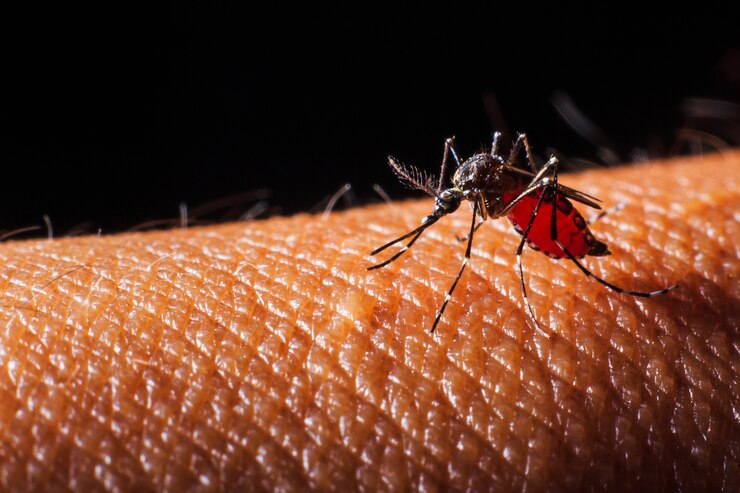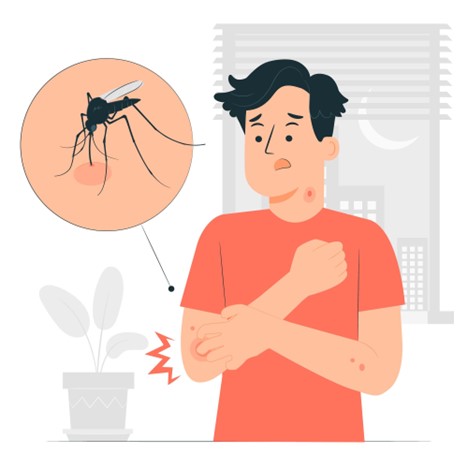Last updated on January 1st, 2025 at 02:16 pm

Dengue is a mosquito-borne viral infection that affects millions of people worldwide. It is caused by the dengue virus and is transmitted to humans through the bite of infected female mosquitoes called Aedes mosquitoes. While dengue fever can be a severe and potentially life-threatening illness, timely and appropriate treatment can significantly improve the outcomes.
Dengue Treatment
Dengue fever is characterized by high fever, severe headaches, joint and muscle pain, and rash. In severe cases, it can progress to dengue hemorrhagic fever or dengue shock syndrome, which can be fatal.
The primary goal of dengue treatment is to alleviate symptoms, prevent complications, and support the patient’s recovery. Here are some key treatment options:
Rest and Hydration:
- Adequate rest is crucial for recovery, as dengue fever can be physically exhausting.
- Stay well-hydrated by drinking plenty of fluids, such as water, oral rehydration solutions, and clear soups. Dehydration is a common complication of dengue fever.
Pain Management:
- Over-the-counter pain relievers such as acetaminophen (paracetamol) can help in reducing fever and alleviating pain.
- Avoid using non-steroidal anti-inflammatory drugs (NSAIDs) such as ibuprofen, as they can increase the risk of bleeding.
Monitoring and Medical Care:
- Regularly monitor your temperature and platelet count. A sudden drop in platelet count may require hospitalization.
- Seek immediate medical attention if you experience warning signs like severe abdominal pain, persistent vomiting, bleeding gums, or difficulty breathing.
> Consult a doctor and Order Medicine Online
Dengue Fever Treatment at Home
While mild cases of dengue fever can often be managed at home, it’s essential to take the right precautions and seek medical advice when necessary. Here are some tips for managing dengue fever at home:
Isolation:
- Isolate yourself to prevent the spread of the virus to others through mosquito bites.
- Use mosquito nets and wear long-sleeved clothing to avoid further mosquito exposure.
Hydration:
- Drink plenty of liquids to stay hydrated. Coconut water and electrolyte-rich drinks can be particularly beneficial.
Fever Management:
- Use acetaminophen (paracetamol) to reduce fever as prescribed by your healthcare provider.
- Avoid aspirin and NSAIDs, which can increase the risk of bleeding.
Nutritious Diet:
- Consume a balanced that is diet rich in fruits, vegetables, and protein as it supports your immune system.
- Foods high in vitamin C, such as citrus fruits, can help boost your immune response.
Rest:
- Get plenty of rest to allow your body to heal.

Dengue Treatment Food
While there is no specific diet to cure dengue fever, a nutritious and balanced diet can aid recovery and support your immune system. Here are some foods recommended for dengue patients:
- Papaya Leaf Extract:
Some of the studies suggest that papaya leaf extract may help in increasing platelet count in dengue patients. However, you must consult your healthcare provider before using it.
- Hydrating Foods:
Foods with high water content, like watermelon, cucumber, and oranges, can help maintain hydration.
- Protein-Rich Foods:
Lean proteins such as chicken, fish, and tofu can support the healing process.
- Antioxidant-Rich Foods:
Antioxidants found in berries, green tea, and dark chocolate may help reduce inflammation.
- Garlic and Turmeric:
Garlic and turmeric have anti-inflammatory properties and may help alleviate symptoms.

Dengue Treatment Medicine
There is no specific antiviral medication for the treatment of dengue fever. However, some medications and supplements may be prescribed to manage symptoms and complications:
- Pain Relievers:
Acetaminophen (paracetamol) is commonly used to reduce fever and relieve pain.
- Intravenous (IV) Fluids:
In severe cases, especially if there is significant dehydration or bleeding, IV fluids and electrolytes may be administered in a hospital setting.
- Platelet Transfusion:
If the platelet count drops to dangerously low levels (thrombocytopenia), platelet transfusions may be necessary.
- Medications to Control Bleeding:
In severe cases, medications to control bleeding may be administered under medical supervision.
It’s crucial to remember that all medications and treatments should be prescribed and monitored by a healthcare professional. Self-medication or the use of unproven remedies can be dangerous and may exacerbate the condition.
Read: What are Generic Medicines?
Dengue Treatment Prevention
While proper dengue treatment is vital once you’ve contracted the virus, the best approach is always prevention. Here are some effective preventive measures to reduce your risk of getting dengue fever:
Mosquito Control:
- Eliminate mosquito breeding sites by emptying containers that collect stagnant water, such as flower pots, tires, and buckets.
- Use mosquito screens on doors and windows to prevent mosquitoes from entering your home.
- Use mosquito nets while sleeping, especially during the daytime when Aedes mosquitoes are most active.
- Apply mosquito repellent on exposed skin and clothing when outdoors.
Clothing:
Wear long-sleeved shirts and long pants to minimize skin exposure to mosquitoes, particularly during dawn and dusk when mosquito activity is highest.
Community Efforts:
- Engage in community clean-up initiatives to reduce mosquito breeding sites in your neighbourhood.
- Support public health campaigns aimed at dengue prevention and awareness.
Travel Precautions:
If you’re travelling to regions where dengue is prevalent, take extra precautions, including using mosquito nets and repellents.
Dengue Treatment Recovery and Aftercare
Recovery from dengue fever can be a gradual process. Even after the fever subsides, you may experience weakness and fatigue for several weeks. It’s essential to continue following a healthy diet, staying hydrated, and getting enough rest during the recovery phase.
Keep in mind that while dengue fever usually results in lifelong immunity to the specific serotype of the virus that caused the infection, it does not provide immunity to the other three serotypes.
This means you can still contract dengue from a different serotype in the future. Therefore, ongoing mosquito protection and preventive measures remain essential, even after recovering from the disease.
Conclusion:
Dengue fever is a challenging illness, but with proper care and timely medical attention, the majority of patients recover fully. Dengue treatment primarily focuses on relieving symptoms, managing complications, and supporting the body’s natural healing process. Adequate rest, hydration, and a balanced diet are essential components of recovery and specific medications should be administered under medical guidance.
Remember that prevention remains the best strategy to combat dengue fever by avoiding mosquito bites through protective measures like insect repellents and mosquito nets. If you suspect you have dengue fever, seek medical advice promptly to receive the appropriate treatment and ensure a smooth recovery.
FAQs on Dengue Treatment
Q1. Is there a specific antiviral medication for dengue treatment?
No, there is currently no specific antiviral medication for treating dengue fever. Dengue treatment primarily focuses on relieving symptoms and preventing complications. Pain relievers like acetaminophen (paracetamol) can help reduce fever and alleviate pain, while hydration and rest are essential components of care. In severe cases, hospitalization may be necessary to manage complications like dehydration or bleeding.
Q2. Can I use aspirin or non-steroidal anti-inflammatory drugs (NSAIDs) to manage my dengue symptoms?
It is advisable to avoid aspirin and NSAIDs (e.g., ibuprofen) when managing dengue symptoms, as they can increase the risk of bleeding, which is a potential complication of dengue fever. Instead, use acetaminophen (paracetamol) as recommended by your healthcare provider to reduce fever and relieve pain safely.
Q3. What should I eat during dengue treatment, and are there specific foods that can help with recovery?
While there is no specific diet to cure dengue fever, a balanced and nutritious diet is essential to support your recovery and boost your immune system. Focus on hydrating foods, such as watermelon and citrus fruits, and consume protein-rich foods like lean meats, fish, and tofu. Additionally, some individuals opt to include papaya leaf extract and foods high in antioxidants, such as berries and dark chocolate, to aid in their recovery.
Related Links:
